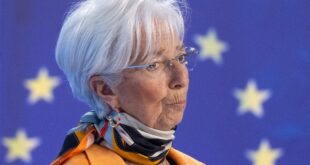Sentiment across the European economy weakened again in March, with confidence in services and retail slumping. The euro area’s index fell to 95.2, deepening doubts over recovery momentum.
After a fleeting spell of stability, sentiment across the European economy weakened again in March. Fading optimism in services and retail sectors pushed confidence deeper below historical levels, casting doubt over the bloc’s ability to shake off stagnation anytime soon.
In a report shared Friday by the European Commission, the Economic Sentiment Indicator for March dropped 0.9 points in the European Union to 96.0, and 1.1 points in the euro area to 95.2—well below the long-term average of 100. The latter missed economic expectations of a rebound to 97.
This also marks the second consecutive monthly decline and underscores mounting concerns over Europe’s near-term economic outlook.
The drop in sentiment was primarily fuelled by declines in confidence across services, retail trade and households.
Services—the backbone of the eurozone economy—saw confidence tumble from 5.1 to 2.4 points, the sharpest monthly drop in four months. The reading missed expectations of a rise to 6.7.
Managers reported a deterioration in their business situation, past demand and future demand expectations, suggesting cracks are forming in one of the most resilient parts of the economy.
Retail confidence fell 1.8 points, dragged down by pessimism in expectations, current conditions and stock levels.
While retail had remained relatively stable in previous months, March’s sharp drop reflects growing caution among both businesses and consumers.
Consumer sentiment, meanwhile, resumed its downward trend after a short-lived pause.
The index fell by 0.9 to -14.5, matching estimates, as households across the bloc grew more pessimistic about their country’s economic outlook and their own financial prospects.
However, there was a modest uptick in intentions to make major purchases, suggesting some resilience in spending behaviour, likely linked to easing inflation and higher wage expectations.
Which countries are losing confidence?
Cyprus recorded the highest Economic Sentiment Index at 106.3, while Germany witnessed the lowest at 89.4.
The variations compared to February were not uniform across the bloc. France and Italy experienced the steepest declines, with sentiment down 2.1 and 2.0 points respectively.
In contrast, Spain saw a notable improvement, gaining 1.1 points, while Germany and Poland posted marginal gains of 0.3 and 0.2. Sentiment in the Netherlands remained unchanged.
Within the broader European Union, Czechia showed the strongest monthly gain in sentiment, with its ESI rising from 98.7 to 101.5, a 2.8-point jump.
Are European businesses still hiring?
The Employment Expectations Indicator also slipped by 0.7 points in both the EU and euro area, falling further below its historical average. The decline was concentrated in retail trade, while expectations in industry, construction and services remained broadly flat.
Despite softer hiring plans, consumers’ own expectations around unemployment improved slightly, suggesting that labour market conditions may still be seen as relatively stable by the public.
Interestingly, the Labour Hoarding Indicator—an index measuring the extent to which firms are retaining workers despite weak demand—remained unchanged at 10.4, staying above its long-term average of 9.7. This hints at a continued reluctance among companies to lay off staff, possibly due to difficulties in rehiring or an anticipation of future recovery.
Are prices stabilising? Not quite
Price pressures remain elevated, yet with some differentiations within sectors.
Managers’ selling price expectations climbed in both industry and construction, though they fell slightly in services and held steady in retail. All four sectors still reported price expectations above long-term averages.
From the household perspective, consumers’ expectations for future price increases continued their strong upward trajectory, sustaining a trend that began in September 2024. In contrast, their perception of past price developments held steady, albeit at high levels.
European stocks fall as auto tariffs rattle market mood
European equities extended their weekly slide during Friday morning trading, as investor sentiment remained pessimistic following US President Donald Trump’s decision to impose a 25% tariff on automobile imports—set to take effect on top of new “reciprocal tariffs” scheduled for next week.
The Euro STOXX 50 index declined 0.7%, deepening its weekly loss to 1.6%, weighed down by sharp drops in major banks and leading automakers.
Shares of Commerzbank fell 3.9%, Deutsche Bank slipped 2.6%, BBVA dropped 2.2% and Unicredit declined 1.8%. Among carmakers, Volkswagen AG lost 1.7%, BMW AG was down 1.5% and Mercedes-Benz AG slid 1%.
Madrid’s IBEX 35 was the region’s worst performer, falling 0.9%.
The euro weakened by 0.3% to 1.0770 levels against the dollar, heading for its sixth day of losses over the last seven.
 topnaijanews Stay informed with the latest Nigerian news at your fingertips
topnaijanews Stay informed with the latest Nigerian news at your fingertips
